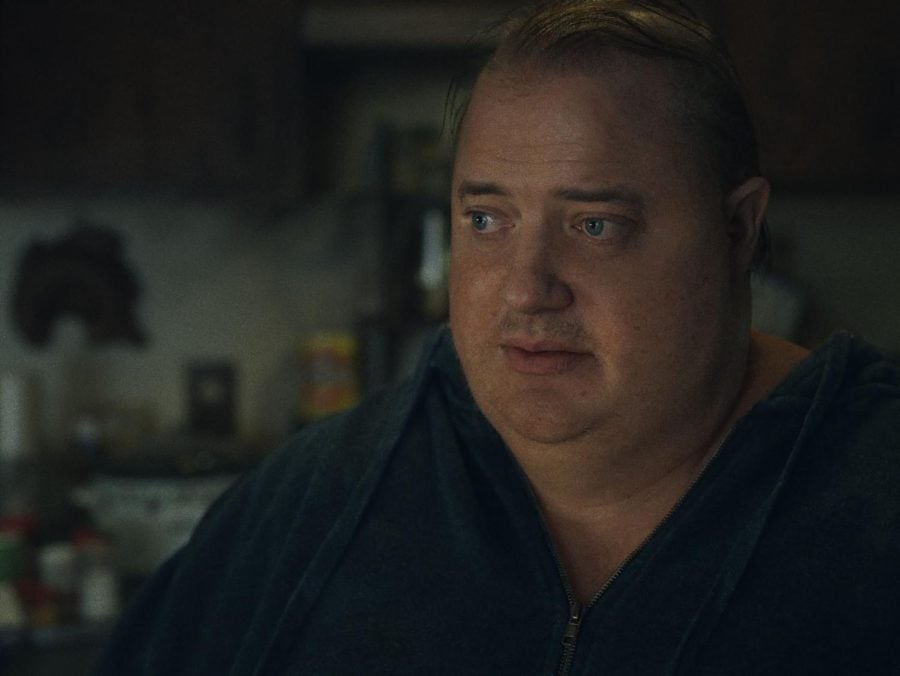Reel Thoughts: Even Brendan Fraser and Sadie Sink’s stunning performances can’t stop ‘The Whale’ from sinking
“The Whale” was released in theaters Dec 9.
January 19, 2023
Warning: This article contains spoilers.
Brendan Fraser’s time as an everyman hunting down skeletons and swinging from tree tops in ’90s films such as “The Mummy” or “George of The Jungle” came to an end years ago. In A24’s “The Whale,” he’s softer, quieter and more compelling than ever before.
Fraser plays Charlie, an obese man seeking to reconnect with his estranged daughter Ellie (Sadie Sink). Beyond the prosthetics applied to Fraser to aid his transformation — which itself has led to criticism and accusations of fatphobia within Hollywood — hides something real, a gracefulness Fraser imbues into Charlie.
Keeping his Zoom camera turned off is Charlie’s own method of hiding his weight from the college students he teaches. Here lies the vehicle of subtlety — a vessel by which to examine the film’s title — and the repetition of Charlie’s consistent request: to have people read him an essay about Moby Dick.
After nearly collapsing from heart convulsions in the opening scene, Charlie asks Thomas (Ty Simpkins), a young missionary, to not call an ambulance or even check his vitals. Instead, he asks to be read an essay on Moby Dick, because he thought he was dying and wanted to hear his daughter’s words one last time. It is eventually revealed that this is her essay, a gateway into the metaphor at the heart of the film.
Charlie constantly refuses to go to the hospital, claiming he can’t afford health insurance or medical care. However, all his time spent teaching has left him with more than $100,000 in his bank account, all untouched, all saved for Ellie.
He says he needs to be able to do one thing right in his life. That one thing is Ellie.
After abandoning his wife and daughter years ago for his now deceased boyfriend Alan, a former student of his, Charlie attempts to repair his relationship with his daughter. He even goes as far as to pay her to spend time with him.
Ellie accepts the offer, and as the two reconnect in the subsequent scenes, the audience — along with Charlie — sees her for the scarred teenager she is. She’s cruel from the moment she enters the film and, most of all, broken.
While many critics have criticized Ellie’s perceptible lack of empathy and natural pent-up aggression, she’s simply a microcosm of Charlie’s own selfishness.
“You can’t throw me away like a piece of garbage and then suddenly want to be my dad eight years later,” she tells him. “You taught me something very important: People are assholes. Most people learn that way too late, you taught me that when I was eight.”
Ellie watched her family be ripped apart at the age of eight. Sink’s reaction to not finding any pictures of her or her mother in Charlie’s home ― instead finding a photo of Alan ― tells us everything we need to know about the pain Ellie has endured. Sink is phenomenal in her role, exuding unbridled emotion and rivaling Fraser’s Oscar-buzzing performance, even when the script itself gives Sink little to work with.
“The Whale,” based on the play of the same name by Samuel D. Hunter, takes place entirely in Charlie’s home. Director Darren Aronofsky does many things well throughout the film, keeping us engaged in a minimalist setting serving as a theatrical deterrent to the visual repertoire Aronofsky has displayed in past films.
However, the film also does several things ineffectively. Charlie’s friend Liz — played with emotional discipline by Hong Chau — is underutilized. Her disillusionment with structures of faith and insistence on blaming Charlie’s suffering on Thomas’ religion explains her initial contempt towards the young man. Yet Liz’s beliefs are contradicted when the church community forgives Thomas for stealing thousands of dollars from his ministry and welcomes him home.
Charlie earns our hearts with ease through his kind soul and gentle exterior. His emotions, unaffected by the rest of “The Whale”’s church-cult-cliche and muddled stage-to-screen adaption, are reminiscent of the empathy Fraser and Sink elicit with artistic brilliance as they’re surrounded by a movie — trying and sinking — to do the same.
Email: [email protected]
Twitter: @andresbuena01
Related Stories:
— Reel Thoughts: ‘Babylon’ captures the dark magic of old Hollywood in intricately messy ways
— Reel Thoughts: ‘The Fabelmans’ is a success as both introspective autobiography and family drama


